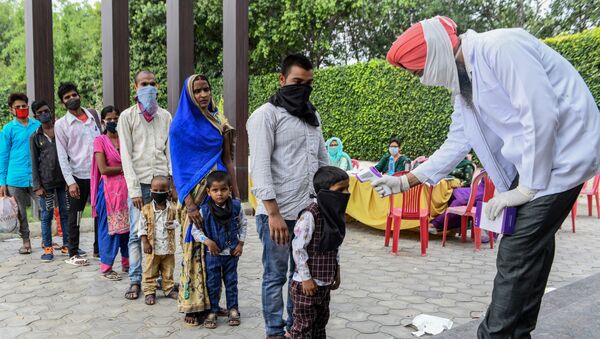An international epidemiologist has warned that as India starts to ease lockdowns and restrictions, the country could see a massive surge of sick people, who have deferred their care for several weeks.
Professor Madhukar Pai, Director of McGill Global Health Programmes and Canada Research Chair in Epidemiology and Global Health told Sputnik that India would have to harness all its resources to deal with the surge in patient load after the lockdown restrictions are lifted.
“They will present with more advanced disease for two reasons: long delays in diagnosis of new, undiagnosed patients, and interrupted regular treatments in those who already had health conditions when lockdowns were imposed,” Professor Pai cautioned.
Professor Pai also warned, based on mathematical models, Tuberculosis, AIDS and Malaria are all set to worsen in the country, as routine services for these conditions have been seriously compromised because of lockdown.
“The models are based on the fact that routine services for these conditions are seriously compromised because of lockdowns, travel restrictions, reduction in supplies, and diversion of healthcare workforce. In India, new TB case notifications have dropped precipitously, and large numbers of TB patients are at risk of discontinuing their TB treatment due to challenges in getting medicines and other support services,” Professor Pai told Sputnik.
India had a caseload of about 400,000 cases of malaria and 85 deaths in 2018 according to the latest data. The registered cases of TB in India in 2018 were 2.16 million, while there were 18.15 million AIDS/HIV cases.
But it is not just TB or malaria. Even basic immunization has stopped in many places and this is disastrous, he warned.
Talking about COVID-19, the epidemiologist said, lockdown was never easy, but it only helped buy time. It is at the same time important to test, trace and isolate all infected persons, which requires a lot more effort and resources.
India, Professor Pai felt, needs to plan for more hospital capacity to deal with sick people, and healthcare workers would need personal protective equipment. Another big issue is that millions of people who are below the poverty line need immediate help to prevent hunger and starvation.
Indian Prime Minister Narendra Modi on Tuesday announced a huge stimulus package of US $266 billion to revive the economy and help millions of poor workers.
Tens of thousands of migrant and daily wage workers were forced to return home after the abrupt announcement of lockdown deprived them of their livelihood.
Though state governments intervened to transport them to their villages, after a huge media outcry, such incidents are still continuing in several northern states of the country.
India imposed a country-wide lockdown from 25 March, which is expected to continue to a fourth phase after the current one ends on 17 May, with certain relaxations.
India, which detected the first case of COVID-19 on 30 January, 2020, currently has at least 74,281 cases of coronavirus and 2,415 deaths, according to the federal Health Ministry.




